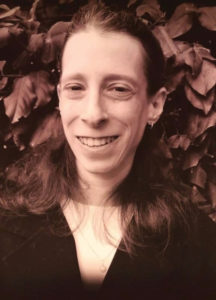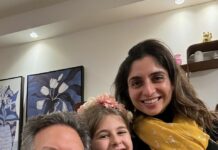
Despite having a disability herself, Sheryl Gloria Grossman always thought about others.
A disability rights advocate, Grossman died on March 28 after battling multiple cancers. She had a rare condition called Bloom’s Syndrome — only 283 people worldwide are on the Bloom’s Syndrome Registry. She was 46.
“She was always talking about how to tweak the community, how to make positive change, reminding us to think about the things that maybe we overlooked,” Rabbi Hyim Shafner said at her funeral.
Shafner knew Grossman when he was a rabbi at Washington University in St. Louis. Grossman graduated with a bachelor’s degree in psychology with a minor in Jewish and Near Eastern studies and a special minor in disability studies. She also earned a master’s degree in social work with a concentration in disability issues.
Grossman made her mark in every community she lived, said Shafner, officiant for the funeral, noting she had a web of hundreds of thousands of people.
She moved to Baltimore for treatment at Johns Hopkins, he said, and did not waste time in plugging into the community.
Her work in the Baltimore area included serving as a board member of Yad HaChazakah – the Jewish Disability Empowerment Center, and involvement with organizations such as the Macks Center for Jewish Education.
Rachel Turniansky, director of disability and inclusion services at CJE, said she and Grossman had a shared mission of supporting inclusion and access to services for children in the Jewish community who have a variety of disabilities.
“She was really driven by that idea of making the Jewish community as accessible as possible,” she said.
Throughout her life, Grossman also advocated for workplace accessibility, housing rights and, recently, access to COVID-19 vaccines for elderly, disabled and homebound people.
“If there was something missing, whether it was a Hebrew school in West Virginia, a vaccine coordinator in Baltimore and so many roles in so many places … in her calm, consistent and humble way she filled the void,” Shafner said.
Though her advocacy was important, religion always came first, said Dana Marlowe, a fellow disability advocate from Silver Spring. Evonne Marzouk, another friend from that area, recalls a nine-year relationship with Grossman studying Mishnah over the phone.
“She was very committed to Judaism and just had a great love of Torah, a great love of learning and a great love of the Jewish community,” Marzouk said.
Marlowe said her devout Orthodox focus coupled with her passion for disability rights made her a force.
One of her biggest areas of advocacy was for people living with Bloom’s Syndrome. Bloom’s Syndrome is a genetic condition; people who live with it are characterized as being short in stature, having a narrow face and decreased immune responses. They are particularly vulnerable to developing heart and lung conditions, as well as cancers. Of the 283 people worldwide on the registry, 148 have developed 240 cancers, according to the National Organization for Rare Disorders. NORD notes the condition is highly prevalent among Ashkenazi Jews.
But Grossman never let her disability hold her back.
Washington University Chabad Campus Rabbi Hershey Novack helped her found Bloom’s Connect, an online resource for people with Bloom’s Syndrome.
“Saturday night she called me and she came to the house with yellow notepads,” Novack said.
She had written down her wealth of knowledge about living with Bloom’s Syndrome in longhand — little pieces of information you would never think about, he said.
She embraced her disability with positivity and humor. When offering suggestions on custom clothing to adapt to the height challenges of Bloom’s Syndrome, Grossman wrote online, “My advice–learn to sew! Alternatively, marry someone rich!” before pointing readers to some web-based resources.
Bloom’s Connect became a lifeline to people all over the world with Bloom’s Syndrome who were looking for shared experience.
She connected hundreds of people with the disability and their family members and organized a conference in Chicago.
But most of all, said Cara Liebowitz, she was a good friend.
“I’m gonna miss her laugh, I’m gonna miss her sense of humor, I’m gonna miss drinking tea with her,” she said.
Grossman is survived by her brother Daniel and parents Karen and Lawrence Grossman. She was the granddaughter of Sam and Freda Fruitman and David and Marion Grossman.






